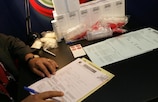Anti-doping education drive at Women's U19s
Friday, August 23, 2013
Article summary
UEFA's anti-doping education programme at the Women's Under-19 finals left the players fully briefed about the testing process and their own responsibilities as elite athletes.
Article top media content

Article body
UEFA's work in anti-doping education has continued at the UEFA European Women's Under-19 Championship in south-west Wales with presentations made to all eight participating teams.
Each session – led by Mike Earl, UEFA's anti-doping and medical manager, and Kevin Haynes, the English Football Association (FA) medical manager – reiterated UEFA's stance against doping, underlining that it is about respect and ensuring a level playing field, in order to protect both the image of the game and the players' health.
The Women's U19 footballers competing at the finals in the Swansea area were briefed on the mechanics of anti-doping, particularly the testing process, and advised about their own personal responsibilities as elite athletes. "Whatever's in your body is your responsibility – you're the one who will face a sanction," Earl told his audience.
The rules and prohibited list established by the World Anti-Doping Agency (WADA) were also discussed and among the infringements mentioned were: a positive test result, possession of a banned substance, tampering with a doping control, refusing to take a test, or behaving disrespectfully during a test.
With the message throughout being one of strict individual liability, Earl stressed the potential risks involved in taking even common medicines which can contain prohibited ingredients. "Check with your team doctor before you take anything," he cautioned. However, he explained how obtaining a therapeutic use exemption certificate will allow ill or injured players access to necessary treatments.
To underscore the same point, UEFA's anti-doping and medical manager cited high-profile examples of players who had been banned after testing positive for prohibited substances. "Even top players can make silly mistakes," said Earl, who also emphasised the dangers of nutritional supplements. A significant risk is also posed by recreational drugs: taking into account all football doping tests worldwide, 60% of positive results are caused by recreational drugs. "Don't gamble with your career," warned Earl, elucidating how a failed test will hurt a player's reputation professionally as well as personally – affecting their club, team-mates and family.
The session also featured an information video talking the players through the doping control procedure. Filmed at UEFA EURO 2012, it showed how blood and urine samples are collected from players and how the doping control station is prepared. The process is carried out under the strictest conditions, with samples following a chain of custody from the moment they are sealed to when they are opened for testing. It was highlighted that four players were tested at every UEFA EURO 2012 match – and that all 124 tests returned negative results.
Earl recommended that the WU19s contact their team doctor, national anti-doping agency or UEFA with any further questions or concerns. Moreover, two information leaflets were distributed: a step-by-step breakdown of UEFA's doping control procedure for players and an information booklet entitled 'Reading this leaflet could save your football career'.






